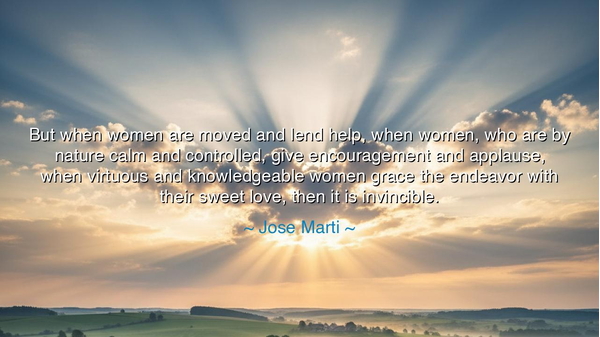
But when women are moved and lend help, when women, who are by
But when women are moved and lend help, when women, who are by nature calm and controlled, give encouragement and applause, when virtuous and knowledgeable women grace the endeavor with their sweet love, then it is invincible.






Hear the stirring words of José Martí, prophet of liberty and poet of the Cuban soul: “But when women are moved and lend help, when women, who are by nature calm and controlled, give encouragement and applause, when virtuous and knowledgeable women grace the endeavor with their sweet love, then it is invincible.” These words, though clothed in the tenderness of praise, burn with a deeper fire: the recognition that no struggle, no movement, no noble cause can rise to its full strength without the presence and power of women. Martí, who gave his life to the liberation of Cuba, knew well that wars may be fought by arms, but victories are sustained by hearts.
The essence of this quote lies in the fusion of strength and gentleness. Martí describes women as calm and controlled, virtuous and knowledgeable—qualities often dismissed in times of revolution, when swords and speeches dominate. Yet he declares that when these qualities are given to a cause, when the wisdom, encouragement, and love of women pour into it, the endeavor becomes invincible. For what army can stand if it fights without the support of mothers, daughters, sisters, and wives? What dream can endure if it is not nourished by the unseen labor, the prayers, the endurance of women?
History offers us countless examples of this truth. In the American Revolution, while men fought on the battlefield, it was women who spun homespun cloth to replace boycotted goods, who tended farms and families alone, and who, like Abigail Adams, counseled leaders with words of vision and foresight. In India, during the struggle for independence, it was women like Sarojini Naidu and Kasturba Gandhi who strengthened the movement, not only through protest but through the quiet force of moral authority. And in Martí’s own Cuba, the mothers of martyrs and the wives of fighters became pillars of resistance, sustaining the revolution with their courage and their unyielding love.
Martí’s imagery of sweet love does not mean weakness, but a deeper kind of power. Love is the force that gives meaning to sacrifice, that keeps men from despair when battles drag on, that reminds fighters of the life they are fighting for. To say that women’s love makes a cause invincible is to recognize that without love, revolutions turn hollow, victories become tyrannies, and movements lose their soul. It is not the sword alone that builds a nation—it is also the lullaby, the letter, the counsel, the hand that binds wounds, the voice that says, “Do not give up.”
The origin of Martí’s words springs from his own life. He was not only a warrior of pen and action but a man of deep sensitivity to human dignity. He saw in women not ornaments of society, but anchors of civilization. He knew that revolutions that exclude them risk failure, for they ignore half the soul of humanity. His vision was not of men marching alone to glory, but of men and women together, each with different gifts, building something greater than either could alone.
The lesson here is clear and timeless: any endeavor, whether personal or collective, gains immeasurable strength when women are fully honored and included. Their calmness tempers rashness, their wisdom illuminates blindness, their love sustains the weary. To dismiss these gifts is to cripple one’s cause; to embrace them is to render it unstoppable.
Practical steps follow: in your own life, seek the counsel of the women around you. Honor their wisdom, respect their strength, and recognize their indispensable role in every endeavor. If you lead, make space for their voices, for without them your vision will remain incomplete. And if you are a woman, remember Martí’s words: your encouragement, your knowledge, your love are not small things—they are forces that can make the impossible possible.
Remember always: movements falter without love, and love shines most brightly when nurtured by those who embody compassion and wisdom. Martí teaches us that when women lend their strength to a cause, it cannot be conquered. Such an endeavor, infused with both courage and tenderness, becomes truly invincible.






AAdministratorAdministrator
Welcome, honored guests. Please leave a comment, we will respond soon